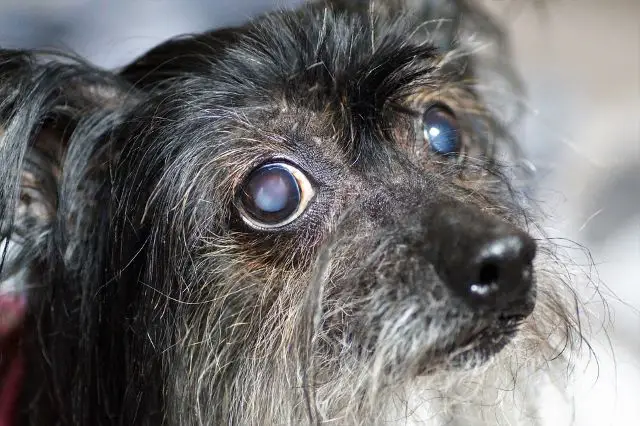Jackapoos are relatively low-maintenance dogs. But just like all of our furry friends, there are some health problems that we need to be aware of to give them as happy and long a life as we can possibly provide for them.

Jackapoos are susceptible to the following health problems:
- Arthritis
- Patellar Luxation
- Hip Dysplasia
- Obesity
- Cataracts
- Dry skin
- Deafness
- Ear infections
- Gum disease
- Addison’s disease
- Cushing’s disease
- Von Willebrand’s disease
- Epilepsy
The Jackapoo mix aims to get the best out of both the Jack Russell Terrier and Poodle breeds, but this doesn’t mean we can totally get rid of all the health problems either breed is prone to. Let’s take a more in-depth look at the different health problems that Jackapoos could develop and how to best prevent and treat them.
Related: Jackapoo Temperament | Jackapoo Coat Types | Is A Male or Female Jackapoo Better? | Jackapoo Generations | Jackapoo Size And Weight Guide
Jackapoo Joint Problems
Arthritis
If you notice your Jackapoo finding it difficult to get up, then it’s good to keep an eye out for Arthritis. This is when the cartilage that protects the joints is destroyed and the cushioning lost leads to pain and less mobility.
The two main problems are degenerative joint disease and inflammatory joint disease. The inflammation causes bony growth and usually affects the hips, elbows, lower back, knees, and wrists. Let’s take a look at the symptoms to look out for:
Symptoms:
- Appetite loss
- Behavioral changes
- Irritability
- Lameness
- Limping
- Reluctance to walk, run or climb stairs
- Sleeping More
- Stiffness
- Unusual peeing in the house
- Unusual weight gain
Prevention
Prevention is always better than cure and even though doing these things still means there’s a chance your Jackapoo could still develop Arthritis. Always choose a reliable breeder so that you can know if there is a record of arthritis in the parents.
Avoid over-feeding or over-exercising your Jackapoo and give them a diet rich with omega 3 and calcium. Being overweight will put a lot of pressure on your Jackapoo’s joints.
Also make sure that your Jackapoo has a comfortable sleeping space, to make sure that any joints are cushioned.
Treatment
- Weight control
- Food
- Exercise
- Animal physical rehabilitation
- Natural over-the-counter treatments
- Acupuncture and massage
- Non-steroidal anti-inflammatory medication
- Cortisone or steroids
- Chondroprotectants
- Surgery
Patellar Luxation
Patellar Luxation is commonly known as a dislocated knee cap. It happens when your Jackapoo’s knee cap rides outside the femoral groove of the leg and can be incredibly uncomfortable and painful. This is one of the most common orthopedic conditions in dogs, especially in small dogs like Miniature Poodles and Jack Russell Terriers.
A traumatic injury sometimes causes it to the knee, but the precise reason is not yet determined but thought to be because of skeletal abnormalities.
Symptoms
- Lameness
- Skipping movement
- Shaking movement
- Bow-legged appearance in hind legs of puppies
Prevention
Always choose a reliable Jackapoo breeder, and ask about any patellar luxation in the parents’ medical history. Avoid over-exercising your Jackapoo, because it’s an easy way to cause dislocations and other health problems in dogs.
Treatment
Treatment for Patellar Luxation depends on the grade of severity:
- Grade 1 – is manipulated out of place but returns by itself or manipulation
- Grade 2 – knee cap moves out of the groove but it can be replaced
- Grade 3 – knee cap can be replaced most of the time
- Grade 4 – knee cap can’t be replaced
Another treatment, for more severe cases, is a reconstruction of soft tissue. This means that vets will deepen the femoral groove so the knee cap can set deep in the groove and not move out of place.
Another surgery requires vets to rearrange the tibial crest, to realign the quadriceps, patella, and tendon.
The last treatment requires the correction of the abnormally shaped femur.

Hip Dysplasia
Hip dysplasia is a common skeletal condition, and although it can occur in Jackapoos it is less common in small breeds.
Hip dysplasia happens when the ball and socket joint doesn’t move smoothly but grind against each other. This leads to the deterioration and loss of function of the ball and socket joint and results in these symptoms:
Symptoms
- Decreased range of motion
- Difficulty or not wanting to move much
- Lameness
- Swaying
- Grating
- Loss of thigh muscle mass
- Bigger shoulder muscles (overcompensation)
- Pain
- Stiffness or limping
Prevention
In order to prevent hip dysplasia you need to keep your Jackapoo on a healthy diet to avoid obesity. Always use a responsible breeder who uses appropriate health screenings to be aware if the parents have any problems with hip dysplasia.
Treatment
Treatment for Jackapoo’s hip dysplasia includes keeping them on a healthy and balanced diet, full of foods with glucosamine. Try to include chewable supplements like these ones to maintain healthy tissues.
If your Jackapoo is overweight and suffering from hip dysplasia, then weight reduction is the key to relieving pressure and pain off their hips. That being said, don’t over-exercise your Jackapoo. Physical therapy is necessary to make sure the proper muscles and joints are being exercised at the appropriate amount.
Using anti-inflammatory medication and joint fluid modifiers will go a long way in relieving your Jackapoo of discomfort and pain.
If your vet decides it’s necessary to do surgery, there are three different types of surgery to consider:
- Double or triple pelvic osteotomy (DPO/TPO)
- Femoral head ostectomy (FHO)
- Total hip replacement (THR)
Jackapoo Weight Problems
Obesity
A pudgy pooch is a sign of obesity, and this condition always invites a host of other problems like heart disease and canine diabetes. Jackapoos are notoriously fast eaters so they are prone to gaining a bit of extra weight. It’s really important to watch your dog’s diet and make sure they’re a healthy size.
A key to identifying if your Jackapoo is obese is to just take a good look at them. Look at their shape, they should not look oval. Look at your dog from the side; a sagging or swinging tummy is a sign of obesity. Your Jackapoo’s abdomen shouldn’t be the same level as the chest. Feel for dog’s ribs, they should not be difficult to feel if they have a healthy weight.
These factors that increase your dog’s chances of becoming obese are their age, sex, and if they have been neutered.
Symptoms
- Excessive body fat
- Jackapoo is an oval shape
- Ribs and waist are difficult to feel
- A sagging or swinging tummy
- The abdomen is at the same level as the chest
Prevention
The best way to prevent any health issues, especially obesity, is to maintain a healthy diet for your Jackapoo. Also include regular exercise in your Jackapoo’s daily routine, which isn’t difficult because of their naturally high energy, which if they are lacking is a clear indication of potentially having other health conditions.
Treatment
Gradual weight loss is key to getting your Jackapoo to a healthy weight. This requires regular exercise and maintaining a balanced and nutritious diet with high-quality products.

Jackapoo Eye Problems

Cataracts
Cataracts are cloudy coverings over the lens of your Jackapoo’s eye. They prevent light from entering the retina and can lead to partial or complete blindness.
They occur when there are changes in the water balance in the lens of the eye and can also be caused by canine diabetes. Cataracts can occur rapidly.
Symptoms
- Cloudy formation on eyes
- Dog bumping into objects
- Partial or complete loss of sight
Prevention
Seeing as water levels and diabetes are the main culprits causing cataracts, the best way to prevent them is to make sure your Jackapoo is on a healthy diet and drinking plenty of water.
Treatment
The only way to treat your Jackapoo’s cataracts is to have them surgically removed.
Jackapoo Skin Problems
Dry Skin
The Jackapoo can inherit dry skin from the Poodle’s genetics. Unfortunately, my dog always suffers from dry skin during the colder seasons all over his tail. The thing about dry skin, even for humans, is that it either comes and goes with the seasons or is chronic and needs to be monitored religiously.
Jackapoos can suffer from dry skin on their paws, nose, elbows, or tail… or all over.
Dry skin is caused by many different things, so take a look at the list to consider what could be causing your Jackapoo’s dry skin.
- Allergens – carpet cleaners, detergents, grooming products, and flea saliva
- Parasites that cause mange – mites, canine scabies, and lice
- Bacterial and fungal infections
- Systemic disorders – Cushing’s disease and hypothyroidism
- Cancer
- Excessive bathing
- Poor nutrition
Symptoms
- Itchiness
- Flakiness
- Pimples
- Scaling
- Hair loss
- Inflammation
- Odor
- Increased oiliness
- Scabs
Prevention
The best way to prevent dry skin is to use hypoallergenic products as much as possible, have a high-quality diet and include supplements when needed, keep updated on preventatives for parasites and groom your Jackapoo regularly.
Treatment
Consult with a vet to determine how best to treat your Jackapoo’s dry skin. Consulting a vet and doing a test will help identify different allergens and help you avoid them. Your vet might even recommend trying allergy shots. Being aware of your dog’s allergies will help you control their diet, and use high-quality ingredients.
Be aware of when the weather changes and use humidifiers when the weather is cold and dry. Build a good routine of using vet-approved shampoo and dog skin moisturizer, especially during the colder months.

Jackapoo Ear Problems
Deafness
Senior Jackapoos can develop complete or partial deafness caused by degenerative nerve changes, inflammation of the outer ear, narrowing of the ear canal, tumors, or ruptured eardrums. There is a high chance that deafness in Jackapoos could be congenital.
Symptoms
- Jackapoo is not woken by loud sounds
- Unresponsive to names, everyday sounds, and squeaky toys
Prevention
Keep your dog’s ears clean, and ask the vet how to do it correctly to avoid hurting your Jackapoo. Keep your Jackapoo away from loud noises because dog ears are a lot more sensitive than human ears.
Treatment
Visit the vet to get a proper diagnosis and treatment plan. The vet will give you medical or surgical approaches and this can include giving your Jackapoo hearing aids.
Ear Infections
Ear infections are quite common for Jackapoos and are caused by moisture; which encourages bacterial growth and yeast; allergies, a thyroid disease, autoimmune disorders, wax buildup, excessive cleaning, or if they have sustained an injury to the ear canal. It’s important to know that an ear infection that is not treated can lead to deafness.
Symptoms
- Head shaking
- Scratching at the affected ear
- Dark discharge or odor
- Redness and swelling
- Pain and Itchiness
- Crusting or scabs
Prevention
Make sure to clean your dog’s ears regularly, but not excessively. Too much of a good thing can be a bad thing in this case. Avoid using cotton buds or paper towels to clean but rather use gauze, especially when drying your dog’s ears after bathing and swimming.
Treatment
Veterinarians will thoroughly clean your Jackapoo’s ears with medicated ear cleanser, and prescribe a topical medication and ear cleanser. For severe ear infections, a vet might prescribe oral anti-inflammatories and antibiotics to clear up the infection and get your dog in top form again.
Jackapoo Dental Problems
Gum Disease
Gum disease, Gingivitis, occurs when there is a buildup of plaque at the base of your Jackapoo’s teeth. This leads to inflammation of the gums and can cause a lot of discomfort, not to mention, bad breath in your Jackapoo.
Symptoms
- Bad breath
- Bleeding gums
- Discomfort
- Drooling
- Inflamed gums
- Loss of appetite
- Pawing at the mouth
Prevention
Just like us owners, if you want to prevent gum disease then you need to clean your Jackapoo’s teeth regularly. There is no substitution for brushing your dog’s teeth but you can:
- Avoid sugary snacks
- Include dental chews and treats
- Use a dental diet
- Trim your Jackapoo’s mustache
Treatment
Your vet can do deep a cleaning to remove plaque and tartar and after that, it really relies on you as the owner to brush your dog’s teeth to maintain their dental health.

Jackapoo Hereditary Health Problems
Addison’s Disease
Addison’s disease is when your Jackapoo has a lower production of hormones like cortisol in its body. This means that they will have an unbalanced control of water, salt, and sugar.
The good news is that Addison’s disease is a less common hereditary health problem in comparison to others, like Cushing’s disease.
Addison’s disease usually occurs in female dogs ages 4 and up and the signs and symptoms can either happen suddenly or occasionally. The severity of the disease will differ on and off.
Symptoms
- Weakness
- Depression
- Lack of appetite
- Vomiting
- Diarrhea
- Increased thirst
- Increased urine production
- Weak pulse
- Slow, irregular heart rate
- Dehydration
Prevention
Addison’s disease isn’t preventable unless it is induced by medication, because if your Jackapoo has Cushing’s disease then the medications used to treat it can cause Addison’s disease. Always monitor your dog on these medications for symptoms of Addison’s disease.
Treatment
Addison’s is not curable, but getting a diagnosis from a vet makes a huge difference in the quality of life because they can give you the best treatment for your Jackapoo.
If your Jackapoos symptoms are severe they will be admitted to the hospital to treat severe symptoms. Replacement hormone medication, injectable mineralocorticoids, and steroids can also be administered but it takes time to find the right dosage to treat.
Cushing’s Disease
Jackapoos are one of the breeds that can develop Cushing’s disease. This is when there is an overproduction of Cortisol, a fight or flight hormone, and is usually caused by a tumor on the pituitary gland.
Cushing’s disease is surprisingly common and is underdiagnosed because it’s mistaken for aging. It can be caused by the chronic application of ear drops containing steroids, so owners should always administer medication correctly.
Symptoms
- Extreme thirst
- Frequent urination
- Muscle loss
- Weakness
- Thinning of the skin
- Lesions on the skin
- Hair loss on the neck, flanks, and perineum (skin between the anus and reproductive organs)
Prevention
Regular checkups at the vet go a long way in diagnosing your Jackapoo with Cushing’s disease. In most dogs, Cushing’s disease condition is quite progressed because of the misdiagnosis and late diagnosis.
You should always be vigilant with using medications but especially with steroids, don’t overuse steroid eardrops if you want to prevent Cushing’s disease.
Treatment
Visit a vet for a diagnosis and treatment plan because locating the tumor will determine the treatment needed. The vet can opt to surgically remove tumors or prescribe oral medications to best treat your Jackapoo.
Von Willebrand’s
Von Willebrand’s is an inherited bleeding disorder because of the reduction of platelets.
There are three different types of this disease, and the Jackapoo is most likely to be affected by Type 1 Willebrand’s which, fortunately, is the least severe of the three.
Symptoms
- Excessive bleeding during teething as pups
- Infections
- Severe bruising
Prevention
Avoid medications that thin blood like aspirin, sulfa-type antibiotics, and heparin. Always buy your Jackapoo from a reputable breeder with a medical history of parents.
Treatment
Blood transfusions are done after severe bleeding and minor bleeds can be treated with bandages, sutures, and wound glue.
Epilepsy
Epilepsy is the most common neurological disorder in dogs and results from an abnormality in the brain, and this can be inherited or have an unknown cause.
- Generalized seizures
- Focal seizures
- Psychomotor seizures
Symptoms
- Twitching
- Uncontrollable shaking
- Collapsing
- Excessive drooling
- Tongue chewing
- Foaming at the mouth
- Making padding motions
- Uncontrollable urination or defecation
- Confusion or looking dazed
- Temporary blindness
- Trying to hide
Prevention
If you want to take preventative measures against Epilepsy then always go through a reputable breeder when getting a Jackapoo. Ask if there is any history of epilepsy in the parents or previous generations.
Keep your dogs away from poisonous materials, plants, and chemicals, and keep a healthy diet to maintain their sugar levels.
Treatment
Always visit the vet for a proper diagnosis and treatment plan for epilepsy, but if your Jackapoo is experiencing a seizure, this is what you need to do:
- Stay calm
- Clear the area of anything that could hurt your dog
- Stay away from the dog’s mouth and head to avoid an accidental bite. Dogs cannot choke on their tongues
- Have a fan or something cool as long seizure could cause your Jackapoo to overheat
- Avoid touching them, but talk to them soothingly and reassuringly
- If your dog is unconscious for longer than 5 minutes take them to the vet immediately to avoid breathing complications and brain damage
Related Reading:
